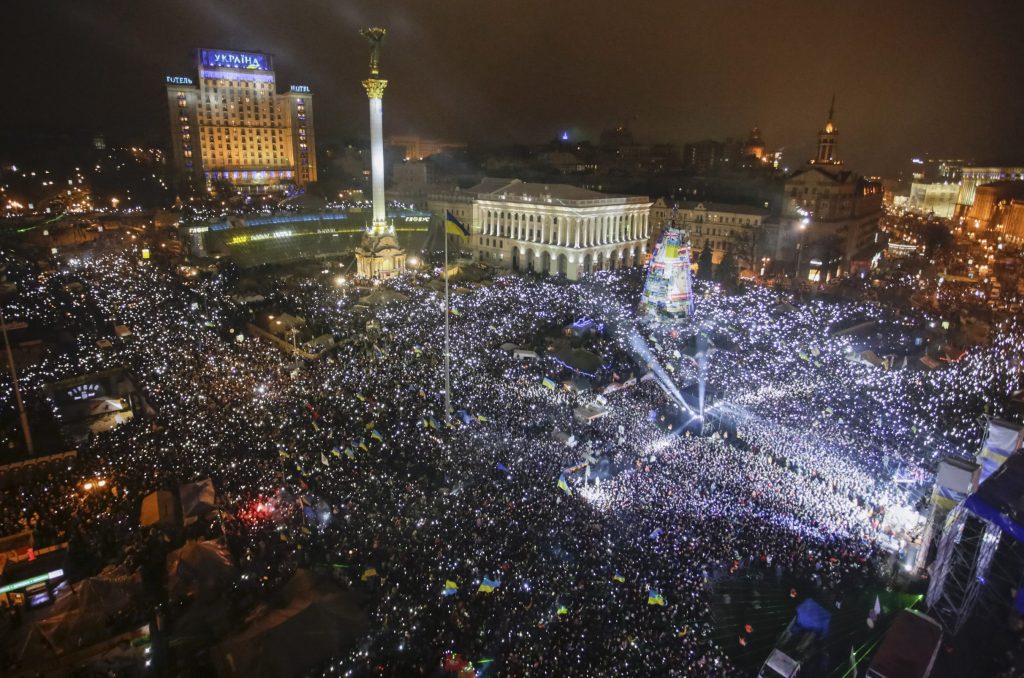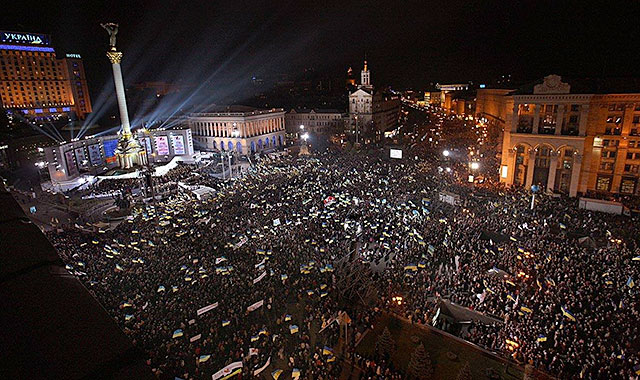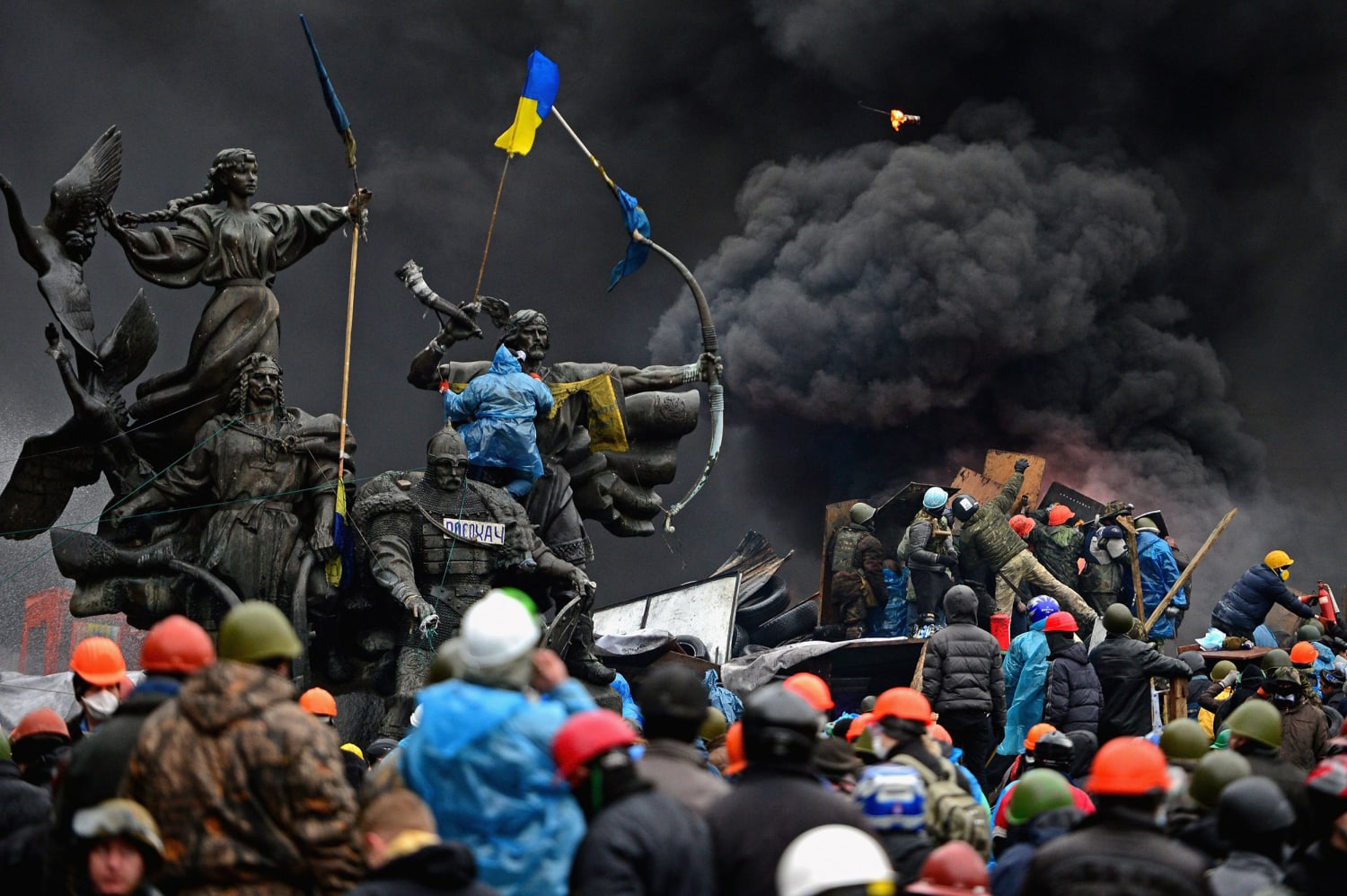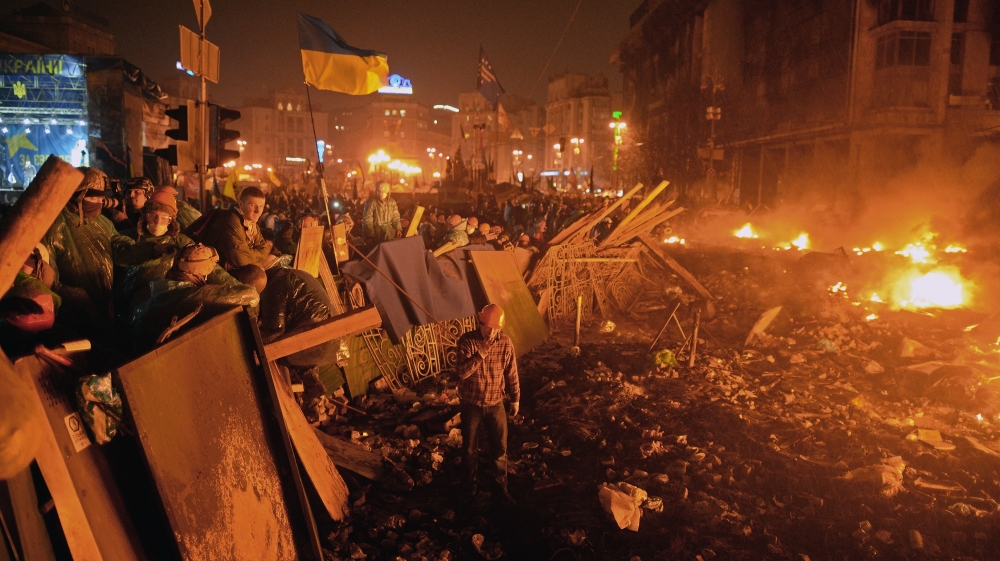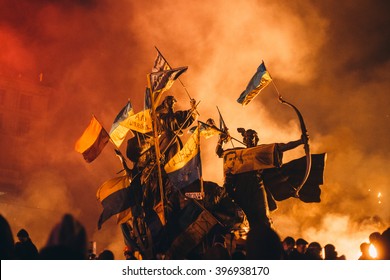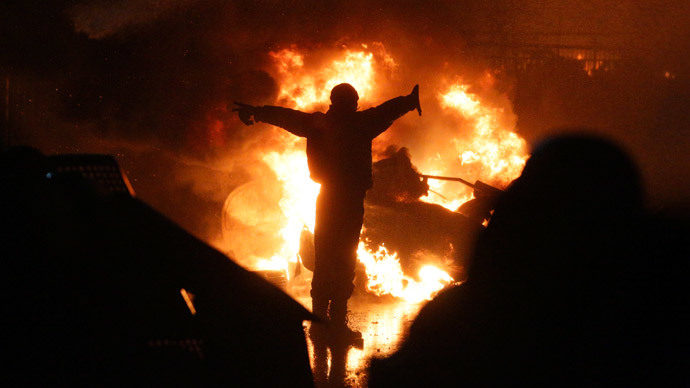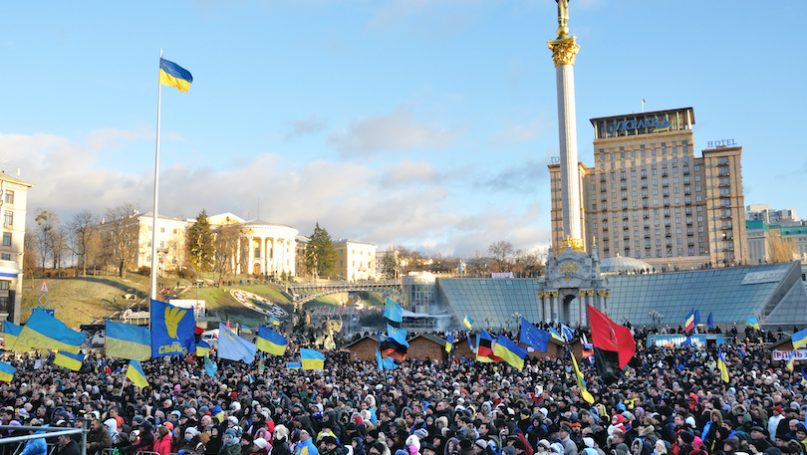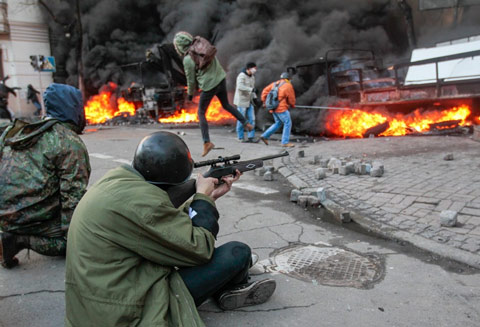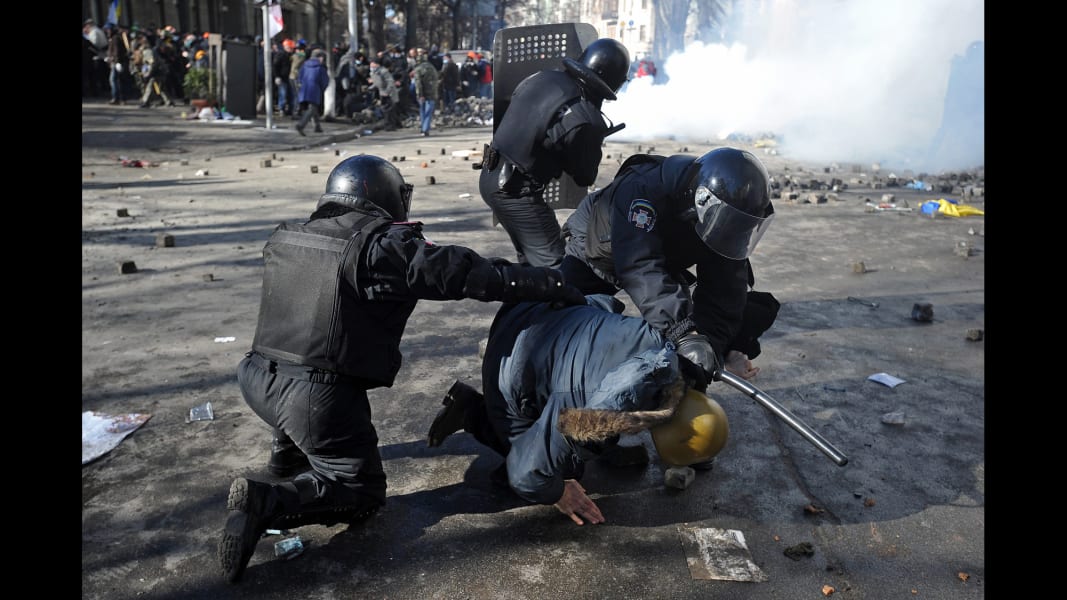The problem is not that the Soviet Union broke up and lost territory. The problem remains that Russia did not lose enough territory. There are too many diverse nationalities still housed inside of Russia. I am not proposing a breakup of Russia. But I am proposing genuine federalism in a new Russian constitution. Russia is not Russia. It is a federation. There is an urgent need to devolve the power out of Moscow.
Russia deserves a genuine, full throttle, cacophonous democracy. Let the people vote. Let the people speak. Let the people organize. Let the people protest.
The genie is out of the bottle. I don't see how things can go back to where they were before Putin marched into Ukraine.
Now the only thing to do is to hasten the demise of the Putin regime. And the best positioned are the ordinary Russian citizens. They need to flood the streets. They need to do what the people of Ukraine did in 2014. Take over. Take Russia back from Putin.
The End Of The Road For Putin https://t.co/CbozCJq3L2 @harari_yuval @NikaMelkozerova @sashavasilyuk @INechepurenko @DanBilefsky #UkraineUnderAttack #UkraineRussiaWar #UkraineRussia #UkraineInvasion #UkraineRussie @WhiteHouse @VP @StateDept #Ukraine
— Paramendra Kumar Bhagat (@paramendra) February 28, 2022
A regional leader in Ukraine's second biggest city, Kharkiv, said Monday at least 11 civilians were killed and dozens injured by Russian shelling of the city. https://t.co/z6Z7XDNMBn pic.twitter.com/LTwTtfpKFm
— CBS News (@CBSNews) February 28, 2022
#Kharkiv mayor Ihor Terekhov to @derspiegel: "Yes, it's true, here they shoot at apartment blocks, there are dead, there are injured. Peaceful people are shot here. A family was shot at in their car and burned to death. It's a war of extermination against the civilian population" https://t.co/nYvKyputBl
— Mathieu von Rohr (@mathieuvonrohr) February 28, 2022
Ukrainian officials say dozens of civilians had been killed and hundreds wounded by indiscriminate shelling in Kharkiv — a city on the border with Russia — as peace talks were ongoing.
— Axios (@axios) February 28, 2022
More updates ➡️ https://t.co/md7RLsqyoa pic.twitter.com/0cycrY4w3k
US says Russia is firing more indiscriminately, citing missiles lobbed at Chernihiv, located roughly 100 miles northeast of Kyiv. But Russia does not yet appear to be employing on a wide scale the same tactics of routinely targeting civilians as in Syria. https://t.co/pWbgiOR9bc
— Samuel Oakford (@samueloakford) February 28, 2022
BREAKING: Vladimir Putin told French Pres. Emmanuel Macron he'll stop strikes against civilian targets, according to the Elysée, and that he'll preserve civilian infrastructure to secure main roads, including the road south of Kyiv. https://t.co/WklsBKILKo
— ABC News (@ABC) February 28, 2022
Russian President Vladimir Putin tells French President Emmanuel Macron demilitarisation of Ukraine, Western recognition of Russian sovereignty over Crimea keys to ending fighting, reports AFP quoting Kremlin
— ANI (@ANI) February 28, 2022
Talks between Russia and Ukraine are set to begin at this table later today, the Belarusian foreign ministry says. pic.twitter.com/Mb4nwsJFjK
— max seddon (@maxseddon) February 28, 2022
Ukraine's delegation, including the defense minister, has arrived at the Belarus border for talks with Russia. "The main issue of negotiations is an immediate ceasefire & withdrawal of troops from Ukraine" @verkhovna_rada
— Alec Luhn (@ASLuhn) February 28, 2022
The transport secretary has asked all UK ports to block Russian ships.
— Alix Culbertson (@alixculbertson) February 28, 2022
Comes as Liz Truss announces further sanctions on Russian banks and a ban on all exports to Russia from the UK. #Ukraine https://t.co/H0krf6hIXZ
The Russian currency has fallen to a historical minimum. Sberbank of Russia Shares at auction in London fell by 75% for the day pic.twitter.com/KlTqpbSvTo
— KyivPost (@KyivPost) February 28, 2022
President @ZelenskyyUa has signed application for the membership of #Ukraine in the European Union.
— Verkhovna Rada of Ukraine (@ua_parliament) February 28, 2022
This is a historic moment! pic.twitter.com/rmzdgIwArc
In an address on the morning of February 28, President Zelenskiy said that every crime of the Russian occupation forces unites Ukrainians. He also spoke about the request to the European Union for the immediate accession of Ukraine to the EU under a new special procedure
— Hromadske Int. (@Hromadske) February 28, 2022
"Our goal is to be with all Europeans and, more importantly, to be equal."
— euronews (@euronews) February 28, 2022
🇺🇦🇪🇺 Ukraine's President Volodymyr Zelenskyy calls for the EU to grant the country immediate accession to the bloc. #UkraineRussia pic.twitter.com/6AT7wY1UWe
We are stepping up our support for Ukraine.
— Ursula von der Leyen (@vonderleyen) February 27, 2022
For the first time, the EU will finance the purchase and delivery of weapons and equipment to a country under attack.
We are also strengthening our sanctions against the Kremlin.
https://t.co/qEBICNxYa1
BREAKING: every woman in your life now has at least a small crush on Volodymyr Zelenskyy and there's absolutely nothing you can do about it
— Emma Salisbury (@salisbot) February 27, 2022
Video has emerged of Jews in Kyiv praying as they take shelter from Russian air raids in an underground shelter. pic.twitter.com/stwAf6UenE
— The Jewish Chronicle (@JewishChron) February 28, 2022
The End Of The Road For Putin https://t.co/CbozCJq3L2 @Europarl_EN @ZelenskyyUa #UkraineUnderAttack #UkraineRussiaWar #UkraineRussia #UkraineInvasion #UkraineRussie #Ukraine
— Paramendra Kumar Bhagat (@paramendra) February 28, 2022
Five days into the Russian invasion, if the test of Biden's leadership is whether or not he could rally the West, there's no way to see it as anything other than him meeting the moment. Stunning how typically relentless conservative media is kind of lost in how to message here.
— Tim Hogan (@timjhogan) February 28, 2022
The New World Order is the entire planet against fascists like Vladimir Putin and Trump.
— Kate 🤍🇺🇸🌻🇺🇦 (@ImSpeaking13) February 28, 2022
I'm confused... I was told this was a conspiracy theory.
— Tim Young (@TimRunsHisMouth) February 28, 2022
"We not only fight for Ukraine, we fight for this New World Order..." pic.twitter.com/j4ACYasDEI
Ukrainian MP. “We are fighting for the New World Order” pic.twitter.com/ABJPOf9MXH
— leilani dowding 🌸 (@LeilaniDowding) February 28, 2022
NOT BACKING DOWN: Ukrainian Parliament member on inspiring civilian resistance: ‘We know that we not only fight for Ukraine, we fight for this new world order.’ https://t.co/1XLnKyxEub pic.twitter.com/Q17wAZyqZl
— Fox News (@FoxNews) February 28, 2022
Putin Calls Out The New World Order And It’s Agenda
— Grant Taylor (@grantltaylor) February 28, 2022
“Anything that does not suit… the powers that be, is denounced as archaic, obsolete and useless… Everything it regards as useful is presented as the ultimate truth and forced on others regardless of the cost, abusively…” pic.twitter.com/AjiPDuhkU6
Would Putin take responsibility for this? 6 year old Ukrainian girl killed during Russian invasion. Stand with Ukraine. Tell Trump that Putin is NOT a “savvy genius”! He’s a killer!
— SM (@sensiblemiddle) February 28, 2022
New World Order Mueller Report Trey Gowdy pic.twitter.com/jcBPKPc5YN
Two faces of the new world order emerging.
— Guy Verhofstadt (@guyverhofstadt) February 27, 2022
500000 citizens in Berlin out for peace and one mad autocrat threatening to kill millions with nuclear weapons! pic.twitter.com/JW4iuYUgnP


